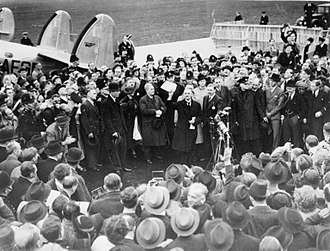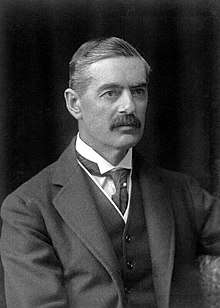Peace for our time
"Peace for our time" was a declaration made by the Prime Minister of the United Kingdom Neville Chamberlain in his 30 September 1938 speech concerning the Munich Agreement and the subsequent Anglo-German Declaration.[1] The phrase echoed Benjamin Disraeli, who, upon returning from the Congress of Berlin in 1878, stated, "I have returned from Germany with peace for our time". It is primarily remembered for its ironic value: less than a year after the agreement, continued pressure for return of the Polish corridor by Hitler, and subsequently the invasion of Poland was followed by declarations of war on Germany by France and the United Kingdom.

It is often misquoted as "peace in our time", which had appeared long before in the Book of Common Prayer as "Give peace in our time, O Lord", probably based on the 7th-century hymn "Da pacem Domine! in diebus nostris, Alleluja".[2] It is unknown how deliberate Chamberlain's use of such a similar term was.
Speeches
Chamberlain's aeroplane landed at the Heston Aerodrome on 30 September 1938, and he spoke to the crowds there:
The settlement of the Czechoslovakian problem, which has now been achieved is, in my view, only the prelude to a larger settlement in which all Europe may find peace. This morning I had another talk with the German Chancellor, Herr Hitler, and here is the paper which bears his name upon it as well as mine. Some of you, perhaps, have already heard what it contains but I would just like to read it to you: " ... We regard the agreement signed last night and the Anglo-German Naval Agreement as symbolic of the desire of our two peoples never to go to war with one another again."[3][4]
Later that day he stood outside 10 Downing Street and again read from the document and concluded:
My good friends, for the second time in our history, a British Prime Minister has returned from Germany bringing peace with honour. I believe it is peace for our time. We thank you from the bottom of our hearts. Go home and get a nice quiet sleep.[3]
Chamberlain's return was not universally well-received. 15,000 people protested against the Munich agreement the same day in Trafalgar Square, three times more than welcomed him at 10 Downing Street. Due to Chamberlain's ongoing manipulation of the BBC, this news was largely suppressed at the time.[5] Labour spokesman Hugh Dalton publicly suggested that the piece of paper which Chamberlain was waving was "torn from the pages of Mein Kampf."[6] Disbelieving Chamberlain, Isaac Asimov published in July 1939 "Trends", which mentions a World War in 1940. He later wrote "I was too conservative" (about when war would begin).[7]
Cultural references
Peace In Our Time is the title of a 1947 stage play by Noël Coward. Set in an alternative 1940, the Battle of Britain has been lost, the Germans have supremacy in the air and the United Kingdom is under Nazi occupation. Inspired to write this play in 1946 after seeing the effects of the occupation of France Coward wrote: "I began to suspect the physical effect of four years' intermittent bombing is far less damaging to the intrinsic character of a nation than the spiritual effect of four years of enemy occupation".
"Peace in Our Time" is a 1984 satirical song by Elvis Costello which references Chamberlain. It is featured on the album Goodbye Cruel World.
U.S. President John F. Kennedy alluded to the speech in his 1963 American University commencement address in which he sought "not merely peace in our time, but peace in all time."[8]
References
- "Neville Chamberlain". Number 10. Archived from the original on 12 September 2008. Retrieved 9 March 2020.
- "The Order for Morning Prayer". Book of Common Prayer. Church of England. 1662.
- "Neville Chamberlain's "Peace For Our Time" speech". eudocs.lib.byu.edu. 30 September 1938. Retrieved 9 March 2020.
- Faber, David (2008). Munich, 1938: Appeasement and World War II. New York, NY: Simon and Schuster. pp. 4–5. ISBN 978-1-4391-4992-8.
- McDonough, Frank (1998). Neville Chamberlain, appeasement and the British road to war. Manchester, UK: Manchester University Press. pp. 124–133. ISBN 0-7190-4831-1. OCLC 36876037.
- McDonough 1998, pp. 106-107.
- Asimov, Isaac (1972). The early Asimov; or, Eleven years of trying. Garden City, NY: Doubleday. pp. 79–82. ISBN 0-385-03979-4.
- Sachs, Jeffrey D. (2013). To Move the World: JFK's Quest for Peace. New York: Random House. p. 74. ISBN 978-0812994926.
